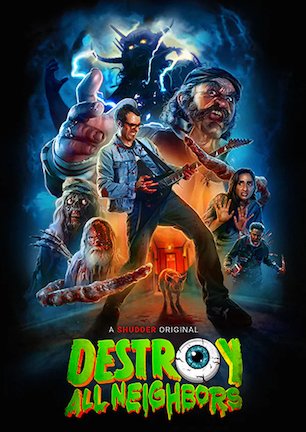Studio: Artsploitation Films
Director: Reinert Kiil
Writer: Reinert Kiil
Producer: Reinert Kiil, Kjetil Jensberg, Svein Andersen, Terje Stromstad
Stars: Frederik von Luttichau, Mats Reinhardt, Sondre Krogtoft Larsen, Espen Edvardsen, Sigmund Saeverud, Anita Ihler, Ingvild Flikkerud
Review Score:
Summary:
Two Nazi soldiers stranded in the snow with a Norwegian POW seek shelter inside a mysterious house haunted by a cursed past.
Review:
Among phrases I attempt to avoid if at all possible are “slow burn” and “arthouse.” I’m rarely successful. They are overused terms, yet oh-so-attractive when it comes to succinctly describing/warning that a movie’s mood takes precedence over visual energy and its style is in step with your local limited release theater as opposed to whatever is now playing at the neighborhood multiplex.
Impatient audiences read “slow burn” and hear “boring” while a more snobbish set might see “arthouse” and think “pretentious.” Creative wordsmithing can find ways to break through these conceptions by taking a different route to descriptions. However, since “The House” (“Huset” in its native Norwegian) director Reinert Kiil used these exact terms when introducing his film at Screamfest, he has relieved me of the burden to come up with something cleverer. In this case, I can simply say, “The House” is a slow-burn supernatural haunter with an arthouse aesthetic whose emphasis is on aura instead of action.
Nazi officer Kreiner and German soldier Fleiss are lost and stranded in a snowy Norwegian forest. Fleiss contemplates killing Rune, the injured POW slowing them down, but Kreiner cautions the young hothead to cool it with cold-blooded murder for the moment. They have a more urgent matter of finding shelter if they are to survive this harsh winter weather.
Kreiner and Fleiss find sanctuary in the form of a remote house standing strangely by itself among the trees. While their Norwegian prisoner hobbles alongside them, the two Germans search the welcoming residence to find hot food on the stove, a flag waving in the front yard, and a radio blaring the news, but no one home. Despite appearances, there doesn’t seem to be a soul in sight, except for the ghosts of something sinister that happened here who are about to haunt each man’s mind.
As time spent in the house advances, Kreiner and Fleiss sense something supernatural is behind the white crosses adorning the walls and symbols scrawled on a closet door upstairs. When the men begin encountering visions of people from their pasts who could not possibly be there, they begin questioning if they have somehow stepped into a sort of psychological Hell from which there may be no escape.
“The House” has more than its fair share of moody moments, but so little of actual story substance occurs that it is difficult to have an emotional response to any of the eeriness onscreen. Rarely is the film intrusively unsettling in a psychological sense because it takes too long to be clued into what is happening to these men and why. Playing cards close to the chest to heighten mystery is one thing. Not giving the audience a breadcrumb incentive to hook into the fiction from the outset is another.
The movie’s uphill battle starts with its chief protagonists. Kreiner and Fleiss have a loose good cop/bad cop dynamic going on, at least when it comes to dealing with POW Rune, where Kreiner has the more favorable personality of the two. Yet being that both men are Nazis, their characters inherently read as bad cop/worse cop, as there is little use asking an audience to sympathize with German WWII soldiers simply on principle.
In a script with wider storytelling eyes opened, the Norwegian prisoner would be the sensible audience surrogate. Except Rune blends so far into the background that you are more than once liable to forget he is even in the house as an active part of the plot with the other two men.
Shot in 12 days for just €90,000, and basically featuring only three primary actors in a single location, “The House” is an excellent exercise in atmosphere above anything else. Reinert Kiil crafts a compelling, simple concept from a chilly, wintry setting with intriguing period tones. Connecting with its creepiness just requires a deep appreciation of tiptoeing down haunted hallways, constant creaking, the persistent metronome of a pendulum clock, etc.
“The House” has it where it counts for atmospheric fear factor. Its fiction however, is too abstractly obtuse to give the additional lift needed to be something more than “okay” for a slow-burn arthouse thriller.
NOTE: The film’s Norwegian title is “Huset.” The film's UK title is "The Winter Siege."
Review Score: 60







No matter what a viewer gets out of the movie, there’s an inescapable sense that its disparate parts are still missing key pieces.